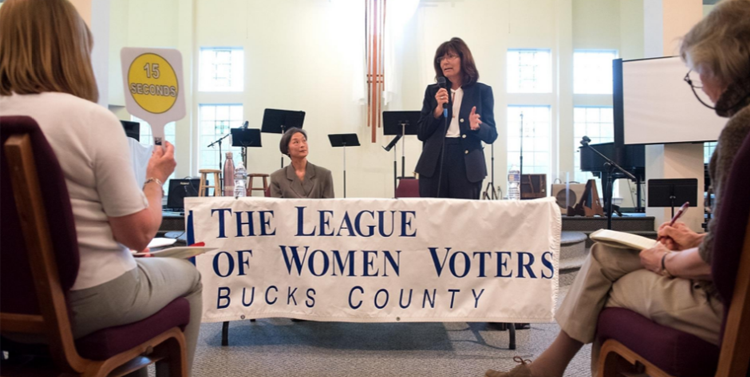
Women, particularly Democrats, are determined to break the “good old boys network” by seeking political office in Pennsylvania, where the number of women legislators is among the lowest in the country.
The numbers speak volumes. Women, primarily Democrats, are running for political office at a level they never have before.
This year, in Pennsylvania, 26 women are running for Congressional seats; 22 of them are Democrats. In 2016, eight women ran for office, seven of whom were Democrats, according to the Center for American Women and Politics, part of the Eagleton Institute of Politics at Rutgers University-New Brunswick.
Across the country, with 16 states yet to reach their filing deadlines, 33 women are running for the Senate, 330 for the House, 46 for governor and 34 for lieutenant governor. “That number will definitely rise,” said Chelsea Hill, information services with the Eagleton Institute, as candidates in the remaining states file to run. In 2016, 40 women ran for the Senate, 272 for Congress, six for governor and 16 for lieutenant governorships.
In Pennsylvania, one of the four candidates for governor is a woman in this year’s May 15 primary, and five of nine lieutenant governor hopefuls are female.
In Bucks County’s new 1st Congressional District, one woman, political newcomer Rachel Reddick, is in a hotly contested Democratic primary race against Scott Wallace and Steve Bacher. And two women, Madeleine Dean and Shira Goodman, are facing off in the Democratic primary in the 4th Congressional District with Joe Hoeffel rounding out the field.
Eleven woman are vying for spots on the general election ballot in November for seats in the state legislature in Bucks and Eastern Montgomery counties.
And in the May 15 special election in the 178th district — encompassing Solebury, New Hope, Wrightstown, Northampton and Upper Makefield — voters will choose between two women candidates, Helen Tai and Wendi Thomas, to determine who serves the remainder of former GOP state Rep. Scott Petri’s term, ending Nov. 30.
Tai and Thomas also are running in the separate May 15 Democratic and Republican primaries, respectively. Because both candidates are uncontested in their primaries, they’re poised to square off again for a full two-year term on Nov. 6.
Women’s unprecedented push for a seat at the political table can be attributed, in part, to the election of President Donald Trump, but also to a broader engagement of women in many issues, say those observing the wave of females running.
“They are looking at the president and Congress and they see how out of touch they are with them and their families,” said Anne Wakabayashi, director of Emerge Pennsylvania, a political action committee that works to recruit, train and mentor Democratic women to run for office.
While Trump’s election was a “catalyst,” Kelly Dittmar, assistant professor for political science at Rutgers-Camden, said it’s important to be careful about identifying any one reason for women’s greater participation.
“For most women, there are many reasons,” Dittmar said. “There’s a distinctive dynamic this year to women’s enthusiasm…progressive Democrats are motivated to push back against the Republican administration and Congress, but beyond party, there’s conversations around the #MeToo movement, women’s rights and the Women’s March.”
Marguerite Quinn, a Republican who has represented the 143rd district since 2006, attributed the high numbers of women running to increased “recruitment of candidates in response to the 2017 elections in which female candidates did well,” and concern over issues in Washington. Some of the growth, Quinn said, “is it’s just that it’s time for more women to get involved and people are realizing this fact.”
Acceptance of women in Harrisburg, Quinn added in an email, also has improved from what she described as “for many years, a men’s club.”
Some would argue the “good old boys network” is still firmly in place. Wakabayashi said Emerge Pennsylvania is working to change that. “It’s very hard to break into politics in Pennsylvania,” she said. “Men hand off their seats to sons or ‘their group’; we need women to counter that.
“There are more men named John (6) in the state Senate than there are women (3),” Wakabayashi said. With 14 percent of the state’s Senate comprised of women and 18 percent of the House, “there’s nowhere near parity,” she noted.
Women, Wakabayashi said, face many obstacles to running, among them questioning their qualifications. The Emerge Pennsylvania program teaches them the “nuts and bolts” of running for office, including fundraising and timelines, and helping them gain confidence needed to be viable candidates.
Eileen Albillar took the Emerge program in Arizona where she lived before moving back to Bucks County. Last year, she was elected to the Warrington Board of Supervisors and currently is an Emerge Pennsylvania board member. Although she’d been involved in some local politics, Albillar said she didn’t consider running for office until she completed the training program. “I didn’t have those skills, so I didn’t think I could run,” she said.
“Women should be represented equally in all levels of government…women have different skill sets to bring to the table,” added the supervisor, who said she’s “very excited” to see so many female candidates across the state and the country.
Sincere Harris, executive director of the Pennsylvania Democratic Party, agrees. Women, she said, “are supportive, we volunteer, we are great public servants, we manage households and multitask, and we’re moving from volunteerism to elected office.”
The World Economic Forum reported that women spend more time communicating with their constituents than men and also deliver more money to their districts than their male counterparts. “Depending on the method, women direct anywhere between 20 percent and 100 percent more spending to their voters,” the 2018 study stated.
“Women woke up in 2016 and have been fired up ever since,” Harris said. “Eventually, we’ll get to 1600 Pennsylvania Avenue.”